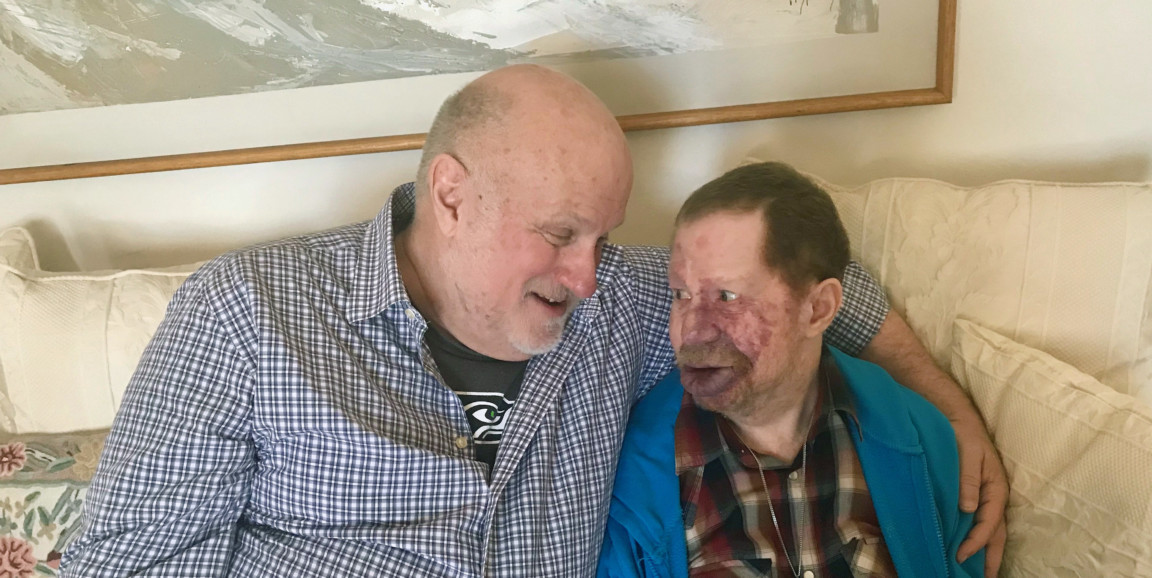"What's wrong with Uncle Danny?" I asked my dad when I was a few years old, the first time I noticed Danny's birthmark. It's the color of port wine, though I didn't know what port wine was back then. "Will I get that too?"
"No," my dad assured me. "But nothing's wrong with Danny. He's always had that."
I didn't learn until many years later my uncle has a rare genetic mutation that led to a disorder called Sturge-Weber syndrome. Dad was telling the truth when he said it's not inherited; the genetic alteration is somatic, which means occurs in fetal cells after conception, independent of the sperm and egg those cells came from.
I hesitated to write about Danny, because his privacy is paramount. But this year, training to become a physician assistant at Stanford's medical school, I've been given priceless wisdom from patients who've openly and generously shared their stories. Danny has taught my family a great deal both as a patient and as a human, so I'm grateful he and other family members were willing to let me share some of his story.
The Sturge-Weber mutation has serious effects because it causes abnormal and excessive blood vessel formation, the reason not only for Danny's birthmark but also for calcifications in his eyes, heart and brain. Doctors had trouble understanding Danny's condition when he was born in the 1950s. He wasn't diagnosed until the mid-1960s; before that, physicians told my family he wouldn't live past 5 years old.
In spite of all that, Danny turned 63 this year. Somehow this makes sense; he's spent his whole life defying expectations. In our "Practice of Medicine" class, we learned that genetics have a proportional contribution to premature death of about 30 percent, while behavioral patterns contribute significantly more, about 40 percent. Danny is a case in point of how health-related behavior contributes to quality of life, and I've come to realize his disorder has actually made my entire family much more psychologically healthy.
For example, Danny helped my dad screen friends and girlfriends. When someone had to avert their eyes from Danny or move away, my dad decided he or she wouldn't be a good person to spend time with. My mom didn't bat an eyelash when Danny ran up to hug her, as was his tendency with everyone. She passed the test, and she's been married to my dad for over 30 years.
Dan's Sturge-Weber came with epilepsy, as it often does, and my grandma was told to keep him in a separate room when she had parties to avoid triggering seizures. But he's a people person, and with the support of my dad and his two sisters, Danny showed he could enjoy social encounters.
Overcoming bullies and more subtle prejudice, he was "mainstreamed" when he reached adulthood. He's lived on his own, made friends, had girlfriends and worked hard at a number of jobs. But growing up, my dad had to protect Danny from people who didn't understand his physical differences.
Maybe Danny trained my dad to be the steadfast, protective father he's been to my brother and me, or maybe my dad has always been that way. Either way, thinking of how my dad was with Danny as a kid makes me a bit ashamed of childhood me who feared she would get that birthmark too. With the genetic tests available today, recorded genetic defects can be used to fuel that type of fear and even to discriminate against those who have mutations such as Sturge-Weber. But seeing the person my uncle has become, especially what a role model he is to others in his genuine goodness, I'm glad I'm not that kid anymore.
On a lifelong journey honing the art and science of patient care, I'm especially grateful for all the times Uncle Dan pushed past assumptions made about him. Patients' genetics don't dictate their limitations, and medical professionals certainly can't. Patients set their own boundaries, and the support of loved ones can help them go beyond what anyone would have predicted.
Sara Lynne Wright, who will be a second-year student in the Master of Science in Physician Assistant Studies Program this fall, has a background working in television and film and a bachelor's degree in English and American literature and language from Harvard. Her loves beyond the art and science of medicine include meditating on the ocean, dancing, singing, both making and watching films, and hiking, especially in her hometown of Seattle.
Photo by Gini Roberts




